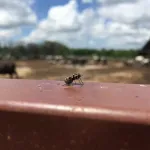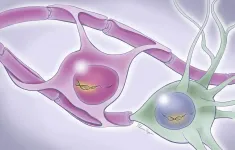People's trust levels predict willingness to engage in COVID-19 control behaviors
Survey across 23 countries finds trust in government, science, and other citizens predicts engagement
2021-03-10
(Press-News.org) Individuals' willingness to engage in COVID-19 control measures is associated with their trust in the government, other citizens, and in particular science, according to a new study published this week in the open-access journal PLOS ONE by Stefano Pagliaro of University of Chieti-Pescara, Italy, and colleagues.
The spread of SARS-CoV-2 since December 2019 has posed a severe public health threat to people around the world. As vaccines are being rolled out, behavioral changes are also necessary to counter the spread of the virus. These actions include both prescribed behaviors such as wearing masks, social distancing, and quarantining, as well as discretionary prosocial behaviors like donating to charities and buying supplies for people in quarantine. The willingness of citizens to engage in such behaviors varies greatly.
In the new study, researchers examined factors that may account for these differences in behavior. They collected data on 6,948 people from 23 countries using an online survey in April and May of 2020. Participants provided sociodemographic information and details about their COVID-19 experiences, and answered questions about their moral principles, trust in their government, other citizens, and science and feelings on the importance of adhering to COVID-19 prevention measures.
The results revealed that the country in which people lived accounted for less than 10% of the variance in predicting engagement in prescribed and discretionary behaviors, and the publicized number of infections was not significantly related to individual intentions to engage in either type of behavior. Instead, behavior was largely predicted by individual differences in trust in their government, other citizens, and in particular science. Moreover, the more people endorsed moral principles of fairness and care, the more inclined they were to trust in science and the more likely they were to carry out both prescribed and discretionary behaviors related to COVID-19. Interestingly, factors such as age, gender, and education did not change the overall pattern of results. The authors conclude that communication strategies to encourage behaviors that limit the spread of COVID-19 should be tailored to the broader moral codes of given countries and subgroups of the population.
The authors add: "We considered individuals' intentions to comply with prescribed and discretionary behaviors to manage the spread of COVID-19 in 23 countries and examined the factors that might drive such behavioral intentions. We showed that the publicized statistics of the pandemic in terms of infections and deaths in each country does not represent the only, or even the most important antecedent of individual reactions, as a threat account of the health emergency would suggest. [...] Instead, considering psychological differences in terms of trust toward different agents - governments, citizens, and science - provide a more informative picture of individuals' reactions to COVID-19. " In particular, "[...] The present research further showed that trust in science represents a crucial factor in shaping individuals' behavior in response to the COVID-19 pandemic."
INFORMATION:
Citation: Pagliaro S, Sacchi S, Pacilli MG, Brambilla M, Lionetti F, Bettache K, et al. (2021) Trust predicts COVID-19 prescribed and discretionary behavioral intentions in 23 countries. PLoS ONE 16(3): e0248334. https://doi.org/10.1371/journal.pone.0248334
Funding: This research was supported by a "Covid-19 Grant" awarded from the European Association of Social Psychology to Stefano Pagliaro and by the Pomilio Blumm Communication Agency. The funders had no role in study design, data collection and analysis, decision to publish, or preparation of the manuscript. There are no restrictions on sharing of data and materials.
Competing Interests: The authors have declared that no competing interests exist. This research was supported by a "Covid-19 Grant" awarded from the European Association of Social Psychology to Stefano Pagliaro and by the Pomilio Blumm Communication Agency. This does not alter our adherence to PLOS ONE policies on sharing data and materials.
In your coverage please use this URL to provide access to the freely available article in PLOS ONE: https://journals.plos.org/plosone/article?id=10.1371/journal.pone.0248334
ELSE PRESS RELEASES FROM THIS DATE:
2021-03-10
New research conducted at the UNESCO World Heritage listed 'Plain of Jars' in Laos has established the stone jars were likely placed in their final resting position from as early as 1240 to 660 BCE.
Sediment samples from beneath stone jars from two of the more than 120 recorded megalithic sites were obtained by a team led Dr Louise Shewan from the University of Melbourne, Associate Professor Dougald O'Reilly from the Australian National University (ANU) and Dr Thonglith Luangkoth from the Lao Department of Heritage.
The samples were analysed using a technique called Optically Stimulated Luminescence (OSL) to determine when sediment grains were ...
2021-03-10
A new study, published this week in Proceedings of the National Academy of Sciences, reveals that nitrogen-fixing trees play an underrecognized role in recovering tropical forests by enriching nutrient-poor soils with scarce elements such as phosphorus and molybdenum.
Coauthor Sarah Batterman, a tropical forest ecologist at END ...
2021-03-10
In previous research, ancient massacre sites found men who died while pitted in battle or discovered executions of targeted families. At other sites, evidence showed killing of members of a migrant community in conflict with previously established communities, and even murders of those who were part of religious rituals.
But a more recent discovery by a research team -- that includes two University of Wyoming faculty members -- reveals the oldest documented site of an indiscriminate mass killing 6,200 years ago in what is now Potocani, Croatia.
"The DNA, combined with the archaeological and skeletal evidence -- especially that ...
2021-03-10
An international research team led by NUST MISIS has developed a new iron-cobalt-nickel nanocomposite with tunable magnetic properties. The nanocomposite could be used to protect money and securities from counterfeiting. The study was published in Nanomaterials.
Presently, research on magnetic nanomaterials with controlled magnetic characteristics is one of the most promising fields. Due to their small size, as well as their excellent magnetic and electric properties these materials have a broad range of potential applications from mobile devices to space technologies.
The new iron-cobalt-nickel nanocomposite was obtained by chemical precipitation, followed by a reduction process.
"This ...
2021-03-10
Researchers hope to use an agricultural pest's genetic code against it to prevent billions of dollars in annual losses in the United States.
Stable flies, or Stomoxys calcitrans, are spotted, tan-colored flies found around the world. They are easily mistaken for the common housefly but for one notable distinction: They bite.
"If you get one in your house and it bites you, it's a stable fly," said Joshua Benoit, an assistant professor of biology at the University of Cincinnati.
Stable flies don't bite so much as chomp. They are the scourge of beachgoers in Florida and recreational boaters in upstate New York. According to Thomas Jefferson, they tormented signatories ...
2021-03-10
DALLAS - March 10, 2021 - UT Southwestern scientists have identified key genes involved in brain waves that are pivotal for encoding memories. The END ...
2021-03-10
Bacteria employ many different strategies to regulate gene expression in response to fluctuating, often stressful, conditions in their environments. One type of regulation involves non-coding RNA molecules called small RNAs (sRNAs), which are found in all domains of life. A new study led by researchers at the University of Illinois describes, for the first time, the impacts of sRNA interactions in individual bacterial cells. Their findings are reported in the journal Nature Communications, with the paper selected as an Editors' highlight article.
Bacterial sRNAs are often involved in regulating stress responses using mechanisms that involve base-pairing ...
2021-03-10
While neurological complications of COVID-19 in children are rare, in contrast to adults, an international expert review of positive neuroimaging findings in children with acute and post-infectious COVID-19 found that the most common abnormalities resembled immune-mediated patterns of disease involving the brain, spine, and nerves. Strokes, which are more commonly reported in adults with COVID-19, were much less frequently encountered in children. The study of 38 children, published in the journal Lancet, was the largest to date of central nervous system imaging manifestations of COVID-19 in children.
"Thanks to a major international collaboration, we found that neuroimaging manifestations ...
2021-03-10
When we recall a memory, we retrieve specific details about it: where, when, with whom. But we often also experience a vivid feeling of remembering the event, sometimes almost reliving it. Memory researchers call these processes objective and subjective memory, respectively. A new study from the Center for Mind and Brain at the University of California, Davis, shows that objective and subjective memory can function independently, involve different parts of the brain, and that people base their decisions on subjective memory -- how they feel about a memory -- more than on its accuracy.
"The study distinguishes between ...
2021-03-10
Aspirin is an established, safe, and low-cost medication in long-standing common use in prevention and treatment of cardiovascular diseases, and in the past a pain relief and fever reducing medication. The use of aspirin was very popular during the 1918 Spanish Influenza pandemic, several decades before in-vitro confirmation of its activity against RNA viruses. Studies showed that aspirin, in addition to its well-known anti-inflammatory effects, could modulate the innate and adaptive immune responses helping the human immune system battle some viral infections.
With this information ...
LAST 30 PRESS RELEASES:
[Press-News.org] People's trust levels predict willingness to engage in COVID-19 control behaviors
Survey across 23 countries finds trust in government, science, and other citizens predicts engagement






